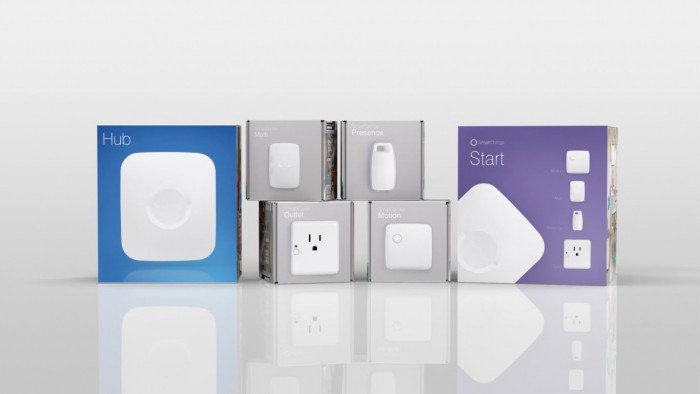 As expected, Samsung’s CEO BK Yoon delivered an Internet of Things-centric keynote. Though the keynote was surprisingly simplistic and quite basic, he did give a high level overview that focused on the importance of open standards. He then committed to Samsung being open and focused on open, interoperable things.
As expected, Samsung’s CEO BK Yoon delivered an Internet of Things-centric keynote. Though the keynote was surprisingly simplistic and quite basic, he did give a high level overview that focused on the importance of open standards. He then committed to Samsung being open and focused on open, interoperable things.
He then introduced Alex Hawkinson, SmartThings’ CEO.
Without going in to any specifics, Hawkinson proceeded to roll out their new hub, new sensors, and a premium cloud service while touting their partnerships and that they’ve doubled the number of developers since being acquired by Samsung six months ago.
The new hub is particularly welcome from we early adopters (I’ve been a user since day one). The current hub only worked when the internet connection was live and it was quite frustrating when their service was down and lights wouldn’t turn on (or off…and be on all night). Now, should your internet connection go down, the hub will still perform all of its functions to trigger events with the ‘things’ connected to it.
Their blog post had this to say about what was new:
The new SmartThings Hub includes a more powerful processor and local app engine, built-in backup battery power, and expanded cellular connectivity. This will enable SmartThings to continue operating in the event of a power or Internet outage.
The new Hub also expands connectivity options to include additional wireless protocols such as Bluetooth Smart, providing customers with the widest range of devices supported by any smart home platform.
They’ve also announced a new family of sensors with modified versions of the SmartSense Presence, SmartSense Motion, and SmartSense Multi sensors.
In addition, a new (optional) premium cloud-based service will “…offer customers advanced incident management control, and improved home monitoring through DVR video streaming.“
While potentially exciting, the cloud service also has a potential downside. Like many companies in the Internet of Things space, SmartThings/Samsung is seemingly salivating over the prospect of having all of our connected-device data flowing to them.
Samsung connected TVs is already collecting our TV watching habits and a comprehensive service collecting significant usage data from within our homes could be problematic from a privacy perspective.
After SmartThings CEO Alex Hawkinson spoke about their new premium service, there was a short segment about how an Internet of Things wine refrigerator could understand consumption patterns and make recommendations, but then went on to talk about the huge benefit for marketing and the supply chain to understand all of it. That intimates in-home usage data would benefit marketers and stores, and potentially also cause unknown privacy breaches.
So perhaps we can set up the new SmartThings hub, get it working, and then disconnect it from the internet?